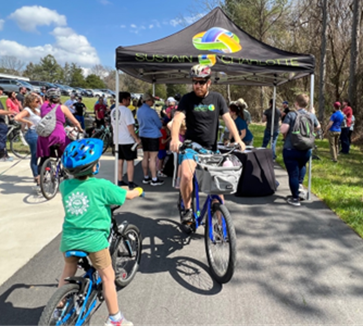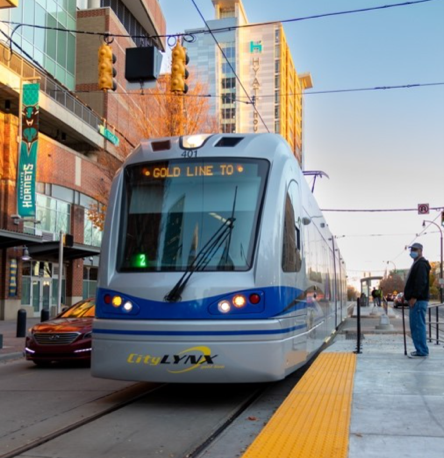Member Highlight: Sustain Charlotte Connects Residents with a Cleaner, More Vibrant Future
Collaboratively Authored by Lauren Sawyers of Sustain Charlotte

This blog features the impactful work that NCSEA member Sustain Charlotte engages in to achieve its mission of creating a more sustainable future for Charlotte-area residents, focusing on transportation and mobility, the economy, buildings and development, and social equity.
Overview of Sustain Charlotte
Sustain Charlotte is a 501(c)3 nonprofit advocating for equitable solutions to support a vibrant environment and economy. The organization believes that Charlotte, one of the fastest-growing urban centers in the country, has the opportunity and responsibility to grow in a thoughtful way that inspires choices that lead to a healthy, equitable, and vibrant community for generations to come.
It prioritizes advocacy for inclusive transportation and land use choices, focusing on areas like improved transit and mobility (enhanced walkability, more bike-friendly routes and reduced traffic), affordable housing solutions, and expanded greenways and parks. Their team engages with residents to collaboratively develop a sustainable vision for the future, while amplifying and activating their voices in decision-making forums.
Sustain Charlotte’s success hinges on its ability to convene diverse groups of residents, communities, officials, developers, and corporations to form creative solutions that allow the city to evolve without exclusion.
Focuses of Sustain Charlotte
Transportation and Mobility

In June 2022, the Charlotte City Council passed the Strategic Mobility Plan, designed to improve Charlotte’s public transportation infrastructure and meet the needs of its growing population. Sustain Charlotte celebrated this as a significant step toward creating a community with safe and equitable mobility choices. The plan refines policies and ensures that investments are fully in line with the city’s vision for growth.
These are vital steps in addressing transportation-related emissions, which now comprise the majority of emissions across the state. The Strategic Mobility Plan is also an important local action that fits within the larger framework of Governor Cooper’s Executive Order 246: NC’s Transformation to a Clean, Equitable Economy and its goal of deploying 1.25 million electric vehicles (EVs) by 2030, along with 50% of new vehicle sales as EVs by that same time.
In addition to setting a multi-modal transportation goal, which aims to reduce the number of commutes taken in a single-occupancy vehicle to 50% by 2040, the Strategic Mobility Plan strives to reduce wait times for transit riders and expand Charlotte’s rail network. Further, it will reevaluate how the city invests resources through an equity lens and focus efforts on communities that have been historically marginalized, while also building more sidewalks and greenways to connect residents to the city and reduce vehicle miles traveled.
“We’ve been advocating for this multi-modal transportation goal since 2020 and are thrilled to see it endorsed by the Charlotte City Council,” said Shannon Binns, founder and executive director of Sustain Charlotte. “This and other goals in the Strategic Mobility Plan will help Charlotte become a city that’s less dependent on cars and safer for pedestrians, cyclists, and transit riders.”
Economy
Sustain Charlotte is helping Charlotte’s economy flourish by advocating for transit options that help cut the costs of car dependence, boost business conditions, and improve public transit. This will not only make the city safer, but also promote a thriving and resilient economy.
Charlotte is currently a car-dependent city, with 76% percent of trips being made by people alone in their cars. A new report from the Charlotte Regional Business Alliance shows that this could cost the city money in the future with highway congestion slowing job growth and economic productivity. Longer commutes also cause employees to lose time traveling to and from work, while increasing stress and commuting costs. If congestion is left unaddressed, Charlotte could miss out on up to 126,100 jobs, $10.1 billion in wages, and $28 billion in economic outputs by 2050.
Sustain Charlotte is attempting to find ways to reduce the number of trips made by cars to accommodate new residents and maintain current commute times. That has prompted the organization to champion more biking and walking paths, as opposed to costly construction of roads and highway expansions. This makes sense through both an environmental and economic lens, as it was found that building bicycle infrastructure yields 46% more jobs than the same amount of money spent on traditional road infrastructure.
Better sidewalks and public transit also connect more residents to work and shopping, which often passes investments back to the local economy. Nationally, public transit creates hundreds of thousands of jobs, from rail and bus operators to transportation analysts. In NC alone, public transportation systems support 12,500 employees and $633 million dollars in wages, according to NC Department of Transportation.
Sustain Charlotte believes that everyone living in Charlotte should have the ability to walk, bike, or take public transportation to get where they need to go. Many households, however, still lack reliable access to driving alternatives, emphasizing the need for continued smart growth solution advocacy.
Buildings and Development
Our built environment plays an essential role in determining a community’s standard of living, while also presenting significant opportunities for carbon reductions. To note, the building sector accounts for nearly 80% of electricity use and 40% of energy use and emissions in the United States. Energy efficiency and building performance codes, pursued in conjunction with the deployment of clean energy technologies, enable cities across the state to reduce energy usage through cost-effective, scalable measures.
Sustain Charlotte has played an integral role in advocating for smarter building standards designed to reduce emissions and promote sustainability in this sector. A key initiative has been pushing for Charlotte’s new Unified Development Ordinance (UDO) since 2017 as a member of the Ordinance Advisory Committee. The UDO evolved from an ensemble of several ordinances into one document to make the planning process for zoning, floodplains, and other projects more transparent and straightforward. The new ordinance will be legally enforceable as part of the Charlotte Future 2040 Comprehensive Plan, which the city adopted last year.
The UDO provides predictability to developers and residents often missing from Charlotte’s development process. Having a clear understanding of that vision will also make the adoption and implementation of sustainability-focused projects more streamlined.
Moreover, the ordinance allows for the creation of additional housing, which is sorely needed amidst a housing crisis. Sustain Charlotte believes that permitting duplexes and triplexes in areas that have traditionally been reserved for single-family homes will increase Charlotte’s housing supply and hopefully lead to a broader range of housing prices, helping more families live in the city and increasing neighborhood diversity.
The UDO also requires more green space in developments, bolstering tree canopy-preservation efforts and changing parking standards. Further, the ordinance includes a bonus structure that could incentivize developers to support clean energy projects in affordable housing, including energy efficiency work and other clean energy solutions
Social Equity

NCSEA is committed to elevating diversity and inclusion throughout clean energy and beyond. Sustain Charlotte shares this guiding principle as it pursues a healthier, more equitable community for all, both now and in the future.
Throughout its work in the areas of transportation, the economy, affordable housing, and development, Sustain Charlotte is committed to advocating for policies that offer fair treatment, access, opportunity, and advancement of all people. NCSEA applauds the organization’s work as it actively identifies and eliminates barriers that have prevented under-represented communities from experiencing the long-term benefits of a sustainable economy.

